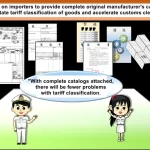 U.S. Customs and Border Protection (CBP) has issued a draft copy of a revised version of the Informed Compliance Publication on Bona Fide Sales & Sales for Exportation to the United States notifying changes to what is called ‘First Sale’ Program. According to various leading law firms, this publication along with the related reference materials should be on the ‘must read’ list for importers entering goods subject to a multi-tier transaction at the foreign manufacturer’s or so-called “first-sale” price.
U.S. Customs and Border Protection (CBP) has issued a draft copy of a revised version of the Informed Compliance Publication on Bona Fide Sales & Sales for Exportation to the United States notifying changes to what is called ‘First Sale’ Program. According to various leading law firms, this publication along with the related reference materials should be on the ‘must read’ list for importers entering goods subject to a multi-tier transaction at the foreign manufacturer’s or so-called “first-sale” price.
The primary method of appraising imported merchandise is transaction value which is the price actually paid or payable for imported merchandise when sold for exportation to the US plus certain statutory additions. This draft notice clarifies that CBP will consider that merchandise is clearly destined for exportation to the US in a multi-tiered transaction when the evidence establishes that at the time the middleman purchased or contracted to purchase the imported merchandise from the foreign manufacturer, the only possible destination for the merchandise was the US (i.e., at the time of sale, the imported merchandise was irrevocably destined for the US).
CBP is of the view that “while formal sales contracts and other types of memorialized agreements (such as distribution or production agreements) generally are most revealing in this regard, other documentation (such as purchase orders, invoices, and proof of payment) evincing or establishing the structure of the transaction are crucial, especially in the absence of any written agreements. The terminology used in such agreements and documentation (i.e., “buyer,” “seller,” “principal,” or “agent”), although indicative, is not dispositive of the role played by each of the parties in the transactions under consideration.”
Importers have to provide all the documentary evidence in support of the transaction value to claim that such a sale is a sale for exportation to the US. In situations where more than one sale has occurred involving the imported merchandise and the importer wants to base transaction value on the price actually paid or payable in a sale to which it is not the buyer (e.g., the price paid for the merchandise in a sale between the foreign manufacturer and a foreign middleman), the importer must be able to establish by documentary evidence that such a sale is a sale for exportation to the US. CBP shall evaluate the relationship of the parties involved in the transaction by an overall view of the entire situation of the individual case – and not by the labels that the parties may attach to the relationship.
In order to establish that merchandise is clearly destined for exportation to the US in a multi-tiered transaction, there must be a complete paper trail relating to the imported merchandise that shows the structure of the entire multi-tiered transaction. This would include invoices, sales contracts, purchase orders, proof of payment, shipping contracts or other documentation for each individual transaction involved in the multi-tiered transaction with consistent prices, dates, parties and merchandise. Other evidence would include manufacture, design, and other unique specifications or characteristics of the merchandise (often manifest in samples) made in conformity with the U.S. buyer’s or importer’s standards; labels, logos, stock numbers, bar codes and other unique marks; and markings, visas, warranties or other types of certification or characteristics required for the entry into and sale or operation of the imported merchandise in the US. All this evidence must show that the only possible destination for the imported merchandise was the US at the time the middleman purchased or contracted to purchase the merchandise from the foreign manufacturer.
An importer who declares a value to CBP without the necessary supporting documentation would not be exercising reasonable care and may be subject to a penalty or other enforcement compliance action.
G.D. JASUJA
Managing Editor
